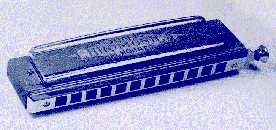 Even before musicians from 22 nations began arriving in the German village
of Trossingen two weeks ago for the World Harmonica Festival, held every
four years, the town already found itself tangled up in blues.
Even before musicians from 22 nations began arriving in the German village
of Trossingen two weeks ago for the World Harmonica Festival, held every
four years, the town already found itself tangled up in blues.Trossingen's main employer, Matthias Hohner AG, the world's best-known harmonica maker, plans to eliminate 300 jobs in the coming year after having cut 100 in the past year. The moves add up to a slashing of the work force by two-thirds, to 200 from 600, over two years.
Deepening losses and slumping sales may seem a surprising fate for a company that manufactured the first harmonica 140 years ago and prides itself on having helped make music history on the other side of the Atlantic, where American blues and folk music became reliant on German instruments.
Bob Dylan, Neil Young, Stevie Wonder, Bruce Springsteen, the Beatles and virtually every blues musician from Muddy Waters and Big Walter Horton to the less prominent acts in Chicago's smoky blues clubs have blown riffs on the harps made in this remote town of 15,000 on the edge of the Black Forest.
Abraham Lincoln, when he was U.S. president, wrote a letter to the Hohner company describing how he relaxed with his harmonica.
''When I began playing 33 years ago, there were no other harmonicas,'' said Peter ''Mad Cat'' Ruth of Ann Arbor, Michigan, named the 1997 harmonica player of the year by the Society for the Preservation and Advancement of the Harmonica. ''Hohner had a monopoly.''
Founded in 1857 by Matthias Hohner, a clockmaker, the company's experience reflects both the glories of German industrial history and the fickle forces of today's global economy, in which attributes such as legendary craftsmanship and near-universal brand recognition no longer suffice to compete against products from China and Japan.
The company waited two days after the end of the Trossingen music festival before it published its somber report for the year ended March 31. It said its loss had widened to 27.3 million Deutsche marks ($15.4 million) from 4.5 million DM a year earlier, while sales dropped 14 percent to 67 million DM.
Shareholders who have gone without a dividend since 1995 have begun to demand radical steps to jazz up the results. Hohner's shares, traded in Stuttgart, slumped 12 percent to 35 DM last week. Ulrich Heine, Hohner's chief financial officer, said the company was looking to Asia, where its rivals have emerged, to find sources for many of the parts now made in Trossingen.
The magnitude of the job cuts prompted the head of the company's workers' council, Willi Messner, to seek assurances that Hohner would not shutter the Trossingen works entirely. Mr. Heine dismissed those fears, saying Hohner could never survive as a pure marketing firm that licensed all the work to Asia and relied solely on its brand name.
''We have to keep the core skills in Germany because we absolutely must be able to print 'Made in Germany' on the instruments,'' Mr. Heine said. Above all, the supple brass tuning reeds sandwiched inside the instrument's cover plates - the part of a harmonica that demands the most precision - are likely to be made in Trossingen, he said.
Hohner once ranked as a prime example of Germany's Mittelstand, the sort of innovative medium-sized business that dominated narrow market niches with high-quality products, often with impressive export success.
Even amid Germany's painful economic restructuring, such firms remain the backbone of the German economy. Collectively they account for more than half of Germany's gross domestic product, employ two-thirds of its work force and have three-quarters of all its registered patents.
By 1880, Mr. Hohner became a pioneer exporter, discovering overwhelming acceptance in freewheeling America for his instruments even as they failed to catch on in Europe's musical establishment, according to Steve Baker, a harmonica musician and author of several books on the instrument.
''It is a very democratic instrument,'' Mr. Baker said. ''It is affordable, relatively easy to play, at least for simple pieces, and accessible to the common man.'' Tapping the American export market, the Hohner company prospered, holding a global monopoly for more than a century.
But over the past two decades, lower-priced rivals have arrived from China and Japan, and a decade ago the company decided on its first layoffs in Trossingen. Harmonica sales slid 5 percent last year, and accordion sales fell 31 percent.
Reprinted from the International Herald Tribune, (Paris: Monday, October 27, 1997, page 1)
1997 Copyright International Herald Tribune http://www.iht.com
| Invitation to Contributors / Submission Guidelines |
| Back to The Free-Reed Journal Contents Page |
| Back to The Classical Free-Reed, Inc. Home Page |